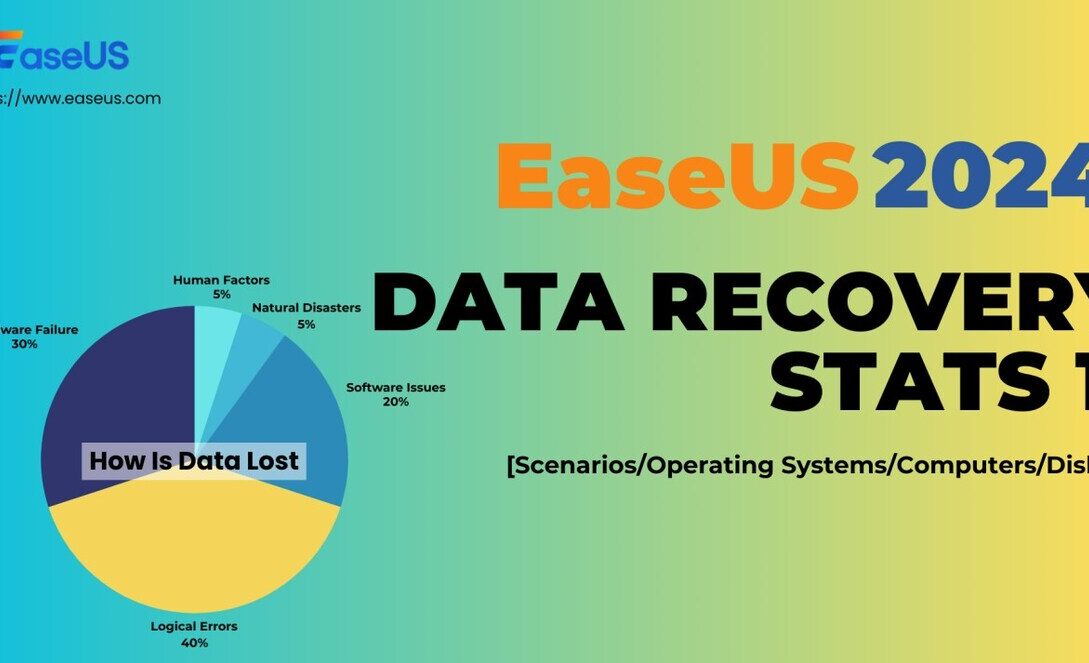EaseUS Releases Comprehensive Data Recovery Statistics for 2024: Insights into Hardware-Related Loss and Recovery Trends
In the digital age, where data serves as the cornerstone of both personal and professional domains, EaseUS, a leading provider of data recovery solutions, unveils its comprehensive report detailing the statistics of data recovery in 2024. Following an extensive six-month user survey involving millions of data points, the report offers invaluable insights into data loss occurrences, the devices that lost data, and the computers and systems that recovered data.
Data Loss Scenarios
The study categorizes 496,142 unique scenarios leading to data loss, highlighting that approximately 40% of cases stem from logical errors, totaling around 198,457 incidents. This category experiences the highest recovery rate. Conversely, 30% of data losses result from physical damage to hardware, necessitating specialized recovery services or preventive measures such as regular data backups.
Operating Systems for Data Recovery
With 635,372 instances analyzed, the report emphasizes the dominance of the latest Windows and macOS operating systems and their influence on data recovery product development. Given their widespread use and evolving distributions, it underscores the importance of software adaptability to these platforms.
User’s Computer Types
Among the 724,769 computers surveyed, the report identifies a clear focus on ensuring compatibility and optimization for Windows systems, alongside a dedicated effort to cater to MacBook Pro and MacBook Air models due to their significant market presence. It also acknowledges the necessity of accommodating legacy Apple devices to broaden accessibility.
Storage Device Types and Sizes
The shift toward Solid-State Drives (SSDs) is prominent among the 726,418 storage devices assessed, necessitating that recovery software optimizes for SSDs while maintaining support for traditional Hard Disk Drives (HDDs). This trend underscores the importance of versatility in handling all disk capacities, from smaller to larger storage units.
File Systems on Windows and macOS
Of the 764,477 file systems examined, NTFS dominates usage trends. However, exFAT has gained prominence as a cross-platform file-sharing solution, particularly for external hard drives. The report advocates for recovery software that proficiently handles NTFS, FAT32, and exFAT while integrating AI and machine learning to tackle unconventional or severely damaged file systems, including HFS+ and EXT series, to serve Apple and Linux users comprehensively.
Observations and Insights
These data studies carry significant implications for the data recovery industry, necessitating software developers to stay abreast of technological advancements and changing user habits. The report advocates for solutions that not only cater to the prevalent use of SSDs and the continued relevance of legacy HDDs but also embrace the cloud backup market, projected to reach $199 billion by 2027. By addressing these shifts, developers can ensure they remain competitive and effectively serve users facing various data loss challenges.
EaseUS invites the public to download the full EaseUS Data Recovery Stats 1 Report PDF for a detailed examination of these findings and encourages sharing this crucial information across social media platforms to raise awareness about data protection and recovery strategies.
SOURCE EaseUS Software & PR Newswire

CONTACT: Ada Bai, adas@easeus.com









